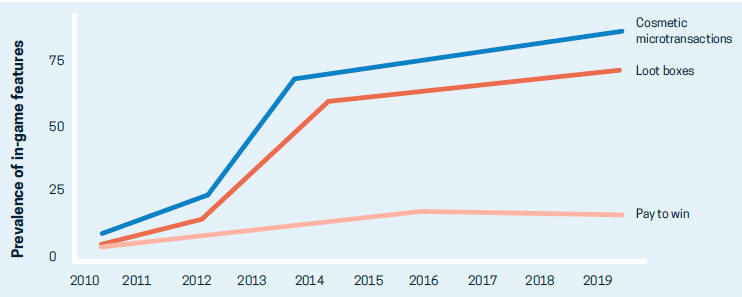4.3 Gaming and gambling terminology
Loot box: An in-game purchase that gives a randomised reward.
Many video games now include loot boxes. Loot boxes are items in video games that contain randomised rewards and can be purchased with real-world money. For example, a loot box might contain points, equipment, or ‘skins’ (see below) for the player to use within the game.
The key feature of concern in loot boxes is that their contents are chance-based – purchasers do not know what they will get. Game companies may advertise the possibility of getting rare or valuable items through loot boxes, but often without disclosing that the odds of getting those items in any given loot box are quite low.
Loot boxes are increasingly common in games. The UK loot box market was estimated at £700 million at the end of 2020,1 and 9 in 10 young people report that loot boxes are available in the games they play.2 Figure 12 shows the increase of loot box availability in desktop games over the last decade.3
The Gambling Commission does not currently consider any in-game purchases, including loot boxes, to fall under the UK government’s gambling laws.4

Figure 12: Prevalence of loot boxes in desktop games on content provider Steam
Another connection between gaming and gambling has to do with the use of skins.
Skins: In-game items that change the way your character, avatar, or weapon looks within a game.
Players can win skins, buy them directly, or find them inside loot boxes. In some cases, players can use skins to gamble on third-party websites that are separate to the game itself.
Skins gambling: Players use websites to trade, bet, or sell their skins in exchange for cash.5
Some games contain gambling-like features, but do not involve any money changing hands.
Social casino: Casino games that are free to play, with no money either to play or to win.
Social casinos often use outcome algorithms that are not random, but rather designed to enhance player engagement and satisfaction.6 This may give some players the impression that they might be ‘good at gambling’ if they played with real money.
Finally, although e-sports are not a form of gambling, people can bet on e-sports.
E-sports: Electronic sports in which people play video games against each other, either professionally or for fun.
Popular e-sports games include first-person shooter games (e.g. Call of Duty), football and other traditional sports games (e.g. FIFA), battle arena games (e.g. League of Legends), and battle royale games (e.g. Fortnite).
The popularity of betting on e-sports soared during the COVID-19 pandemic restrictions, as an alternative to betting on live sports while they were unavailable during lockdown. Betting on e-sports increased by 2922% in one year, from £50k in March 2019 to £1.5 million in March 2020.7 E-sports betting revenue remains high (£1.8 million in February 2021) despite many live sporting events resuming over the course of 2020-2021.
